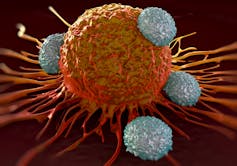Until fairly lately, it was unusual to see the words “cancer” and “cured” used in the same sentence. Now, it’s much more common. Reports that toddler Layla Richards had been cured of what was thought to be an incurable form of leukaemia were followed with news that former US president Jimmy Carter was cured of brain cancer – a melanoma that had spread from his liver.
In both these cases the most up-to-date immunotherapies were used to treat cancers that normally have poor survival rates. These new treatments use the body’s own immune system to identify and kill the cancer and their success in difficult to treat cancers has led to them being hailed as a cure. But is “cured” the right word?
When is a cure not a cure?
The dictionary definition of cured is: to relieve (a person or animal) of the symptoms of a disease or condition; or eliminate (a disease or condition) with medical treatment. These definitions, then, are open to interpretation.
With infections, a cure is the point at which the invading pathogen is removed from the body – using antibiotics, say – so that it is undetectable and the patient is returned to a healthy state. But a cure is not always achieved despite it seeming so, as some infections and viruses can hide and lay dormant even when someone appears in good health. One high profile example was the HIV infected baby who was reportedly cured in 2013 after treatment with antiretroviral drugs. The absence of detectable virus led to the belief that the baby was free of the virus. However, when the drugs were stopped the virus returned.
When it comes to cancer, successful therapy is generally described by professionals as being either in “partial remission” (the cancer has shrunk or stopped growing) or “complete remission” (the cancer is undetectable). Even when patients are in complete remission this does not represent a cure because it is almost impossible to say that all the cancer cells have been destroyed and do not exist in another part of the body. Indeed, if a cancer does return it usually does so within five years of remission.
The future’s bright

Immunotherapy has one very important advantage over conventional chemotherapy and radiotherapy. Once an immune response to the cancer has been initiated it will target the cancer at the site in which it originated, as with conventional therapy. But with immunotherapy the responding immune cells are able to create a memory of the cancer, which can persist for many years, allowing detection and killing of any further cancer cells that may have spread from the original site. It is this important property that has led to the argument that patients that have undergone successful immunotherapy have been “cured” of their cancer when no cancer is detectable.
The ability to treat “incurable” cancers and improve cancer survival is an exciting prospect, but the use of “cure” to describe the status of these patients is premature. Immunotherapies are still in their infancy and we have to be careful not to overstate the claims until the results of long-term studies of patients undergoing this treatment are available. Despite this, the early evidence of strong anticancer immune responses is very encouraging and compelling, and gives a great deal of hope to cancer patients that one day they will really be rid of the disease once and for all.

